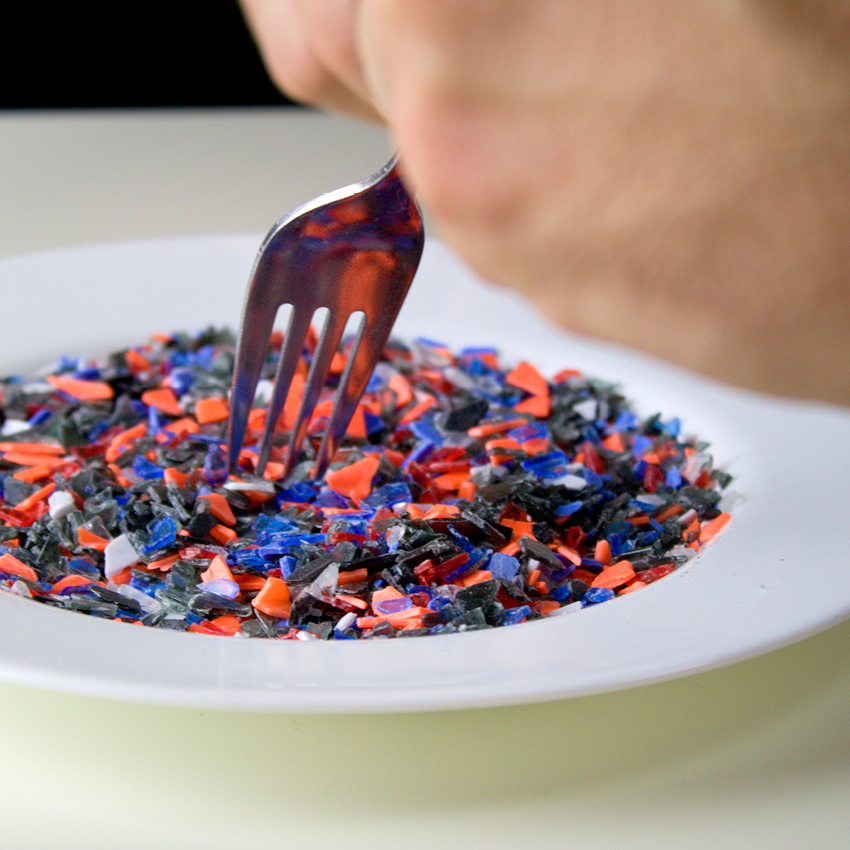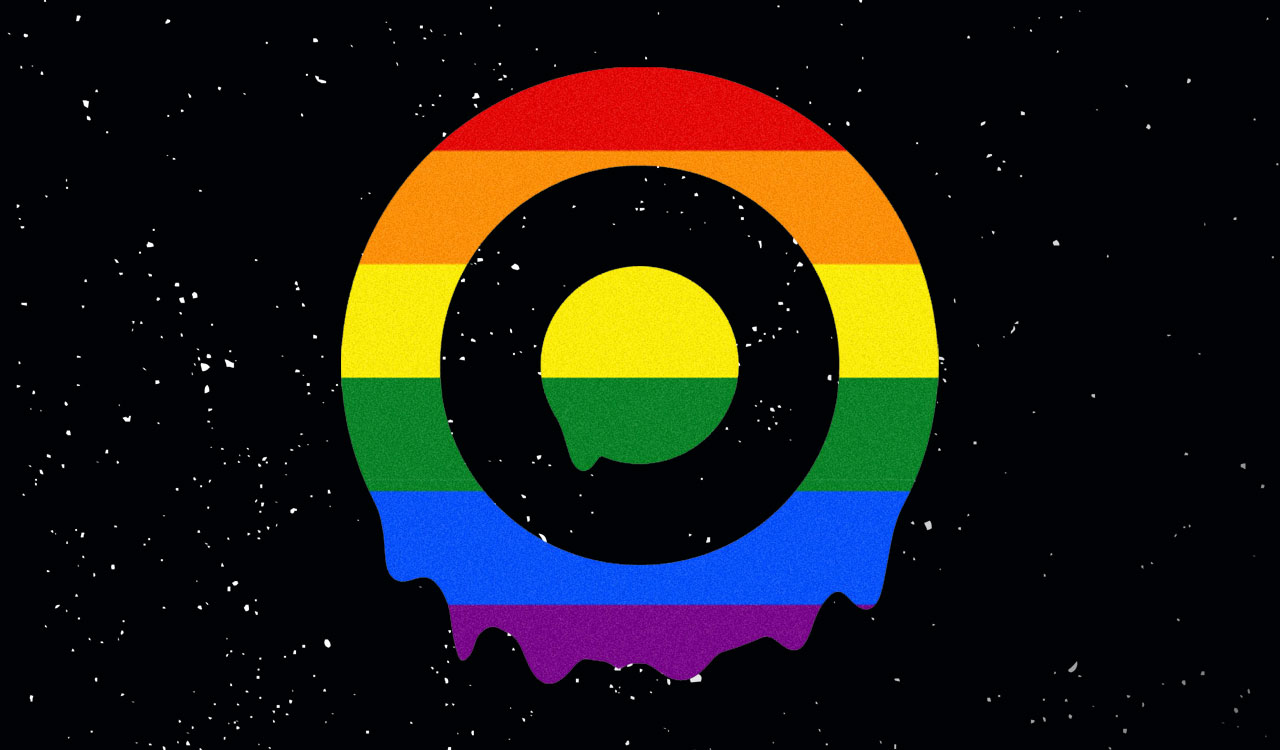What would it take to get you to eat a credit card every week for an indeterminate amount of time? Answer: You’re already doing this voluntarily.
When I first heard that there was a massive chunk of plastic in the Pacific Ocean twice the size of Texas and three times the size of France called the Great Pacific Garbage Patch, (GPGP), it blew my mind. But that concept is so abstract I just can’t get an in-my-face, personal feeling or tactile sensation. So, it eventually ends up in a part of my brain where I compartmentalize all the horrible environmental, global warming and climate change information, which is being disseminated at an accelerating pace with crystal clarity. These warnings set off more and more alarm bells each day. Yet, this constant ringing in our ears is risking us becoming inured to a clear and present global danger.
[callout]A University of Newcastle research paper found that people might eat up to 124,000 bits of plastic a year. And people who regularly drink bottled water may add another 90,000 pieces to their annual intake. Essentially plastics are polluting the air we breathe, the water we drink and the food we eat.[/callout]
A Living Metaphor
When a credible association like the WWF reports that me, myself and I are ingesting a credit card’s amount of microplastic every week, try as I might I cannot not tuck that fact away in the safe room in my brain. The report. “No Plastic in Nature: Assessing Plastic Ingestion from Nature to People” was executed by the microplastics research team at the University of Newcastle in Australia and released in 2019. Forgive my tardiness for discovering it in 2021. However, my urgent thoughts about this issue would have been no less than than they are now.
So, this article is my attempt at another call for urgency. And I mean now.
Eat the Card
My guess is you wouldn’t eat your credit card, even if you were being forced under torture to do so, or possibly offered a million dollars for each one consumed. But guess what, we are ingesting the equivalent of the card’s plastic every week. The study found that the global average of microplastic ingestion could be five grams every week. It’s a teaspoonful of 2000 tiny bits of plastic.
And worse, if you think you can wash it down with a swig of water, think again. The largest source of plastic ingestion comes from water, both bottled and tap, providing 1769 of the tiny plastic bits consumed per person, per week. How does the plastic get there? They are fibers coming from industrial waste. Released with other gases and chemicals, plastics ultimately sink into freshwater bodies and then find their way into our drinking water.
I use the credit card equivalent of the average person’s ingestion of microplastics in water simply to raise the same level of shock among my readers that I experienced. Just think about taking your credit card, putting it in your mouth, chewing it and finally swallowing it. Words escape me.
While the card metaphor provokes our attention, the researchers in a separate paper say the ingestion of a teaspoon full of plastic particles a week is only a tip of the iceberg. A University of Newcastle paper found that people might eat up to 124,000 bits of plastic a year. And people who regularly drink bottled water may add another 90,000 pieces to their annual intake. Essentially plastics are polluting the air we breathe, the water we drink and the food we eat.
To reiterate, the WWF says, \”Plastics are polluting not only our oceans and waterways but also marine life and humans. Urgent, global action is needed to face this crisis.\”
The WWF research study also states that “prior to the 1960s there was no plastic pollution anywhere. It wasn’t because plastic didn’t exist back then, in fact, plastic had actually been invented early in the 19th century, over 150 years ago. At the end of the 1950s however, something happened that would change our world forever. Dramatic improvements in the manufacturing and processing of plastics saw the costs decline dramatically and combined with the abundance of oil, triggered mass plastics production. This is where the explosion of disposable plastic products began.”
From Dustin Hoffman’s Ears to…
I’m old enough to recall the 1967 movie, “The Graduate,” starring Dustin Hoffman playing a college kid, Benjamin Braddock. At one point in the movie, Mr. McGuire, an elderly businessman whispers to Benjamin, “I just want to say one word to you. Just one word, Benjamin, plastics…is the future.”
Did the scriptwriter of that movie really envision where we are today 70 years later? Astounding! At the time, plastics was reviled by the Hippie generation, making Mr. McGuire’s prediction even more of a cultural flashpoint. Maybe the next-gens at the time intuitively understood the potential of plastics to pollute the planet and endanger humans and wildlife.
Closer to Home
Forget eating a credit card every week. How about eating your clothes? According to Friends of the Earth, 64 percent of our clothes contain plastics like polyester, nylon, acrylic and polyamide. In fact, most new fabrics are made of plastic. And every time we wash these materials, they shed millions of plastic microfibers that end up in the air, water and food that we ingest.
More, More, More! Enough Already!
A report produced by the Circular Fibres Initiative (which aims to build a circular economy for textiles, starting with clothing) highlights the following fast facts:
- Every second, the equivalent of one garbage truck of textiles is landfilled or burned.
- An estimated $500 billion value is lost every year due to clothing that\’s barely worn and rarely recycled.
- Less than one percent of material used to produce clothing is recycled into new clothing.
- Worldwide, clothing utilization—the average number of times a garment is worn before it ceases to be used—has decreased by 36 percent compared to 15 years ago.
- Clothes release half a million tons of microfibers into the ocean every year, equivalent to more than 50 billion plastic bottles.
Are You Motivated Yet?
There is only one purpose for this article. It is to shock all of us once again into action. I get as inured as everyone else in the industry who is not directly involved in the ecosystem of sustainability and/or the circular economy. I admit, I have previously set aside the warning drumbeats of apocalyptical horrors.
If Benjamin had the mindset of his era’s Hippies and now today’s Gen Z, he might have retorted to Mr. McGuire, “Sir, plastics are going to kill the future.”
So, we must ask the hard question: “Will plastics inherit the earth?” What are you doing about it




